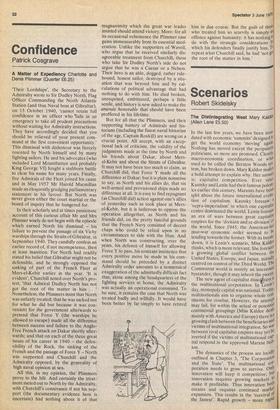Confidence
Patrick Cosgrave
A Metter of Expediency Charlotte and Denis Plimmer (Quarter £6.25) 'Their Lordships', the Secretary to the Admiralty wrote to Sir Dudley North, Flag Officer Commanding the North Atlantic Station (and thus Naval boss at Gibraltar), on 15 October 1940, 'cannot retain full confidence in an officer who 'fails in an emergency to take all prudent precautions without waiting for Admiralty instructions. They have accordingly decided that you • should be relieved of your present command at the first convenient opportunity.'
This dismissal with dishonour was fiercely resented by North himself and by many fighting sailors. He and his advocates (who included Lord Mountbatten and probably King George VI) fought a stubborn battle to clear his name for many years. Finally, five Admirals of the Fleet joined his cause and in May 1957 Mr Harold Macmillan made an eloquently grudging parliamentary statement in his favour. But North was never given either the court martial or the board of inquiry that he hungered for.
In their scholarly and at times passionate account of this curious affair Mr and Mrs Plimmer wisely do not begin with the episode which earned North his dismissal — his failure to prevent the passage of six Vichy warships through the Straits of Gibraltar, in September 1940. They candidly confess an earlier record of, if not incompetence, then at least inanition. For. North had readily stated his belief that Gibraltar might not be defensible, and he strongly opposed the sinking of part of the French Fleet at Mers-el-Kebir earlier in the year. 'It is evident', Churchill noted over North's protest, 'that Admiral Dudley North has not got the root of the matter in him . .
Nonetheless, the Plimmers insist that North was unfairly treated; that he was sacked not for what he did but because it was convenient for the government afterwards to pretend that Force Y (the warships he allowed to escape) made all the difference between success and failure to the AngloFree French attack on Dakar shortly after wards; and that on each of the three great issues of his career in 1940 — the defensibility of the Rock, the sinking of the French and the passage of Force Y —North was supported and Churchill and the Admiralty opposed, by the generality of high naval opinion at sea.
All this, in my opinion, the Plimmers prove to the hilt. And certainly the treat ment meted out to North by the Admiralty, with Churchill's connivance if not his support (the documentary evidence here is uncertain) had nothing about it of that
magnanimity which the great war leader insisted should attend victory. More: for all its occasional vehemence the Plimmer case gains immeasurably from its essential moderation. Unlike the supporters of Wavell, who argue that he received similarly disagreeable treatment from Churchill, those who take Sir Dudley North's side do not argue that he was a Caesar or a Nelson. Their hero is an able, dogged, rather rulebound, honest sailor, destroyed by a situation that was beyond him and by calculations of political advantage that had nothing to do with him. He died broken, unrequited, embittered, perhaps a little senile, and history is now asked to make the amende honorable that should have been proffered in his lifetime.
But for all that the Plimmers, and their supporting battery of Admirals and historians (including the finest naval historian of the age, Captain Roskill) are wrong on a crucial point. All accept, with an exceptional lack of criticism, the validity of the judgments made at the time by North and his friends about Dakar, about Mersel-Kebir and about the Straits of Gibraltar. It may not have been too much to claim, as Churchill did, that Force Y made all the difference at Dakar: but it is plain nonsense to say, as North and his allies do, that six well-armed and provisioned ships made no difference at all. It is easy to find repugnant (as Churchill did) action against one's allies of yesterday such as took place at Mers el-Kebir, but it is ludicrous to oppose the operation altogether, as North and his friends did, on the pretty fanciful grounds that the French Navy consisted of decent chaps who could be relied upon in no circumstances to side with the Hun. And when North was constructing, over the ' years, his defence of himself for allowing Force Y to pass, his constant insistence that every positive move be made in his com mand should be preceded by a distinct Admiralty order amounts to a nonsensical exaggeration of the admittedly difficult fact that, alone among the headquarters of the fighting services at home, the Admiralty was actually an operational command. To be sure, it remains the case that North was treated badly and wilfully. It would have been better by far simply to have retired him in due course. But the guilt of thog who treated him so scurvily is simply as offence against humanity: it has nothing le do with the strategic considerations b) which his defenders finally justify him. repeat what Churchill said, he had 'not gal the root of the matter in him.'


































 Previous page
Previous page